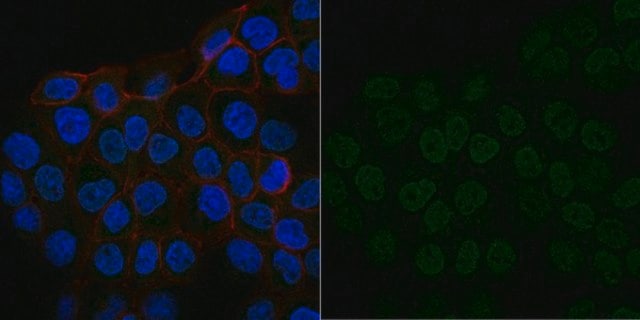04-959
Anti-Retinoid-Related Orphan Receptor γ T Antibody, clone RORg2
clone RORg2, from hamster(Armenian)
Synonym(s):
RAR-related orphan receptor C, RAR-related orphan receptor gamma, retinoic acid-binding receptor gamma, nuclear receptor ROR-gamma, retinoid-related orphan receptor gamma, Nuclear receptor RZR-gamma, RZR-GAMMA, Nuclear receptor subfamily 1 group F member
About This Item
Recommended Products
biological source
hamster (Armenian)
Quality Level
antibody form
purified antibody
antibody product type
primary antibodies
clone
RORg2, monoclonal
species reactivity
mouse
technique(s)
western blot: suitable
NCBI accession no.
UniProt accession no.
shipped in
wet ice
target post-translational modification
unmodified
Gene Information
mouse ... Rorc(19885)
General description
Immunogen
Application
Inflammation & Immunology
Inflammation & Autoimmune Mechanisms
Quality
Western Blot Analysis: 2 µg/mL of this antibody detected Retinoid-Related Orphan Receptor γ T (RORγT) in 10 µg of EL4 cell lysate.
Target description
Physical form
Storage and Stability
Analysis Note
EL4 cell lysate
Other Notes
Disclaimer
Not finding the right product?
Try our Product Selector Tool.
Storage Class Code
12 - Non Combustible Liquids
WGK
WGK 1
Flash Point(F)
Not applicable
Flash Point(C)
Not applicable
Regulatory Listings
Regulatory Listings are mainly provided for chemical products. Only limited information can be provided here for non-chemical products. No entry means none of the components are listed. It is the user’s obligation to ensure the safe and legal use of the product.
JAN Code
04-959:
Certificates of Analysis (COA)
Search for Certificates of Analysis (COA) by entering the products Lot/Batch Number. Lot and Batch Numbers can be found on a product’s label following the words ‘Lot’ or ‘Batch’.
Already Own This Product?
Find documentation for the products that you have recently purchased in the Document Library.
Our team of scientists has experience in all areas of research including Life Science, Material Science, Chemical Synthesis, Chromatography, Analytical and many others.
Contact Technical Service






